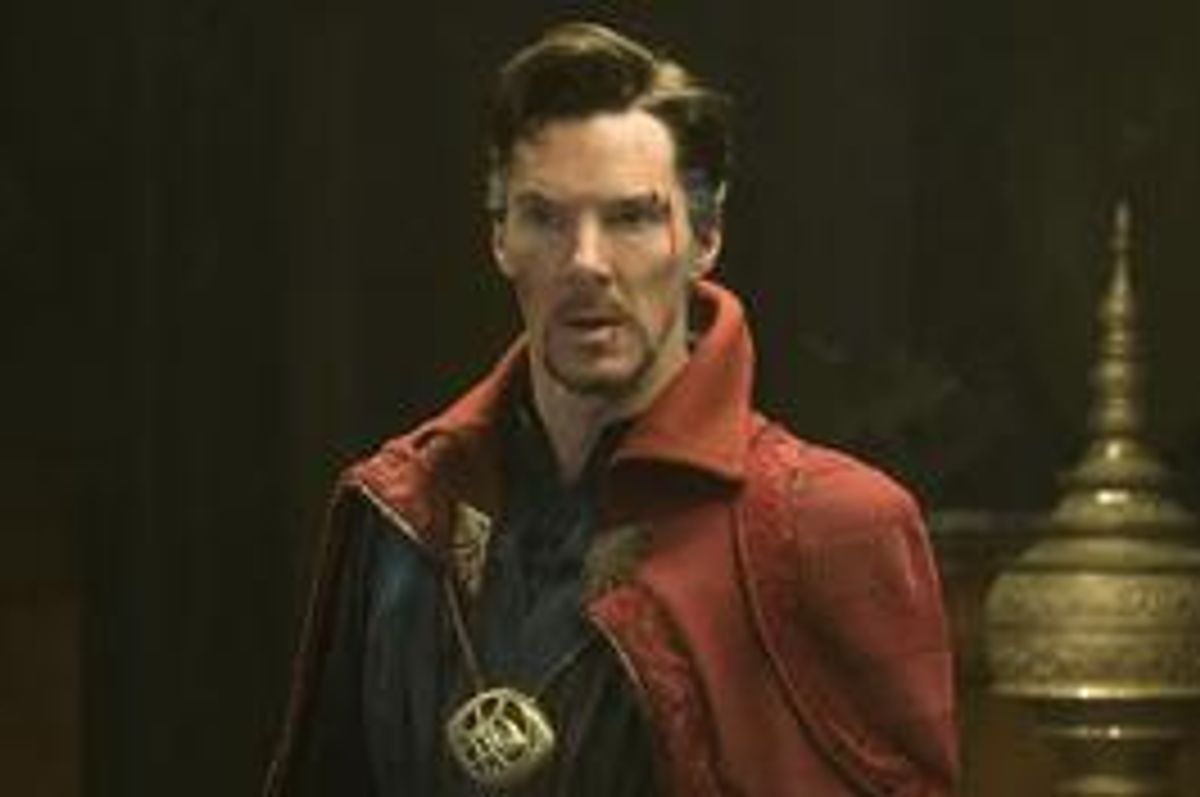Disney refuses Saudi Arabia's request to cut 12-second 'LGBTQ reference' from Doctor Strange 2
It only takes 12 seconds to stand for something.

Benedict Cumberbatch in 'Dr. Strange'
Dr. Strange might find himself in multiple universes, but probably not in Saudi Arabia.
Marvel’s follow-up to their 2016 hit starring Benedict Cumberbatch is set to introduce a new character named America Chavez, played by Xochitl Gomez. In addition to being able to punch holes through the multiverse (nifty power), America is openly gay in the comics and will be represented similarly in the film.
The Guardian reported that Saudi Arabia, which regards homosexuality as a capital offense, has asked Disney to cut “LGBTQ references” before screening. Egypt and Kuwait have already prohibited the movie.
Nawaf Alsabhan, Saudi Arabia’s general supervisor of cinema classification, told the Guardian that the cuts would amount to “barely 12 seconds” and include America referring to her “two moms,” but noted even that arguably-minute portion of the film would be “very tough to pass” according to the kingdom’s standards.
So far, Disney has refused the request. And it doesn’t look like they’re backing down.
Though the movie has not been officially banned, it would not be the first Marvel film to be stripped from Saudi Arabia’s theaters. In November 2021, “The Eternals” was not released and was removed from websites due to portraying a same-sex couple. The two married characters, Phastos (Brian Henry) and Ben (Haaz Sleiman) share a kiss. And only one month later, Steven Spielberg’s “West Side Story” suffered the same fate for having a nonbinary character.
💬Nawaf Alsabhan, Saudi Arabia’s general supervisor of cinema classification, said: “It’s just her talking about her moms, because she has two moms. Being in the Middle East, it’s very tough to pass something like this.”https://t.co/W2L1XKWNjX
— Irish Daily Mirror (@IrishMirror) April 26, 2022
Disney has received an increasing amount of attention (both in the form of praise and criticism) for its role in LGBTQ advocacy.
.
On the one hand, the franchise offers an ever increasing amount of representation not only for the LGBTQ community, but for other marginalized, underrepresented groups. On the other hand, fans have also expressed feelings of betrayal over the company previously donating money to Republicans who supported Florida's so-called “Don’t Say Gay.” Some Pixar employees also came forward claiming the majority of inclusive scenes featured in the animated film “Turning Red” had been cut by studio executives.
So, is Disney’s refusal to cut these scenes from "Dr. Strange 2" simply pandering in order to maintain some kind of “woke” image? The film’s lead doesn’t seem to think so. In a press tour for the movie, Cumberbatch shared how the “expected disappointment“ of the ban further emphasized the necessity for inclusion.
“We’ve come to know from those repressive regimes that their lack of tolerance is exclusionary to people who deserve to be not only included, but celebrated for who they are and made to feel part of a society and a culture and not punished for their sexuality,” he said. “It feels truly out of step with everything that we’ve experienced as a species, let alone where we’re at globally more as a culture, but frankly, it’s just even more reason why this isn’t tokenism to include an LGBTQ+ community member."
“Doctor Strange in the Multiverse of Madness” promises a journey across alternate realities while confronting power foes. Hopefully by Disney maintaining its stance, we will get closer to our very own reality where there is more tolerance and compassion.
- Here's why it's a big deal that the Disney Channel now has an ... ›
- 5 questions we have about Disney's first explicitly gay character ... ›
- Disney Introduces A Gay Couple On A Kids' Show, Confusing ... ›
- Doctor in India stuck in traffic runs 45 minutes for surgery - Upworthy ›
- Doctor in India stuck in traffic runs 45 minutes for surgery - Upworthy ›
- Man cosplays as Walt Disney - Upworthy ›
- Man 'offended' by LGBTQ doormat, challenges couple - Upworthy ›



 Meatloaf was a staple dinner.
Meatloaf was a staple dinner. Spaghetti is still a classic.
Spaghetti is still a classic. Why were pork chops so popular?
Why were pork chops so popular?
 Pluto and Goofy along with Chip and Dale. Photo by
Pluto and Goofy along with Chip and Dale. Photo by  Dogs aren't normally allowed onboard cruise ships unless they're service dogs, like Forest. Photo by
Dogs aren't normally allowed onboard cruise ships unless they're service dogs, like Forest. Photo by 
 Smiling girl chatting outdoors with a friend.
Smiling girl chatting outdoors with a friend. Smiling warmly in a cozy sweater, feeling relaxed and happy.
Smiling warmly in a cozy sweater, feeling relaxed and happy.
 What do you do when you find an egg where it doesn't belong?
What do you do when you find an egg where it doesn't belong? 
 Sick woman in bed with thermometer, scarf, and hot water bottle on neck.
Sick woman in bed with thermometer, scarf, and hot water bottle on neck.